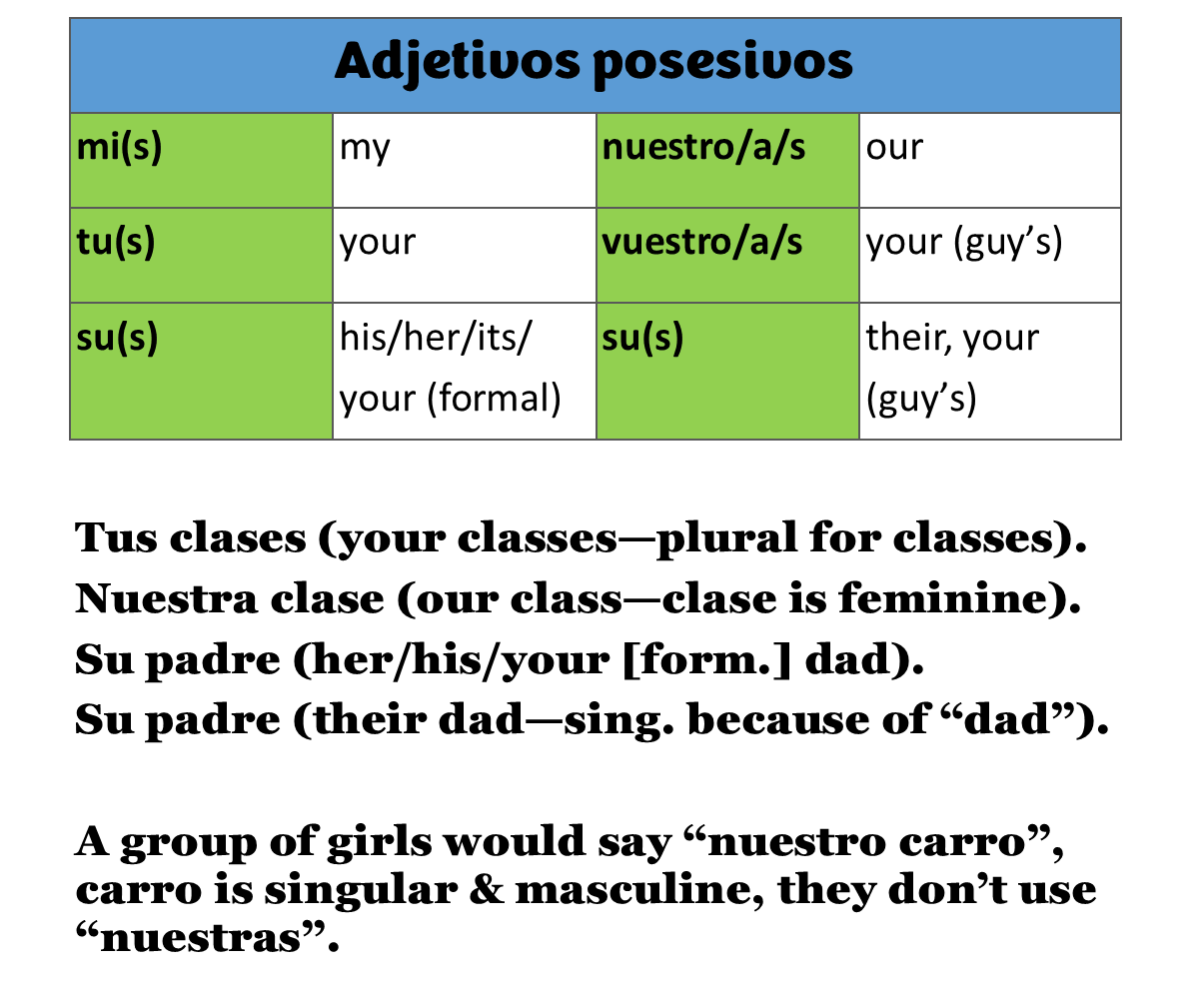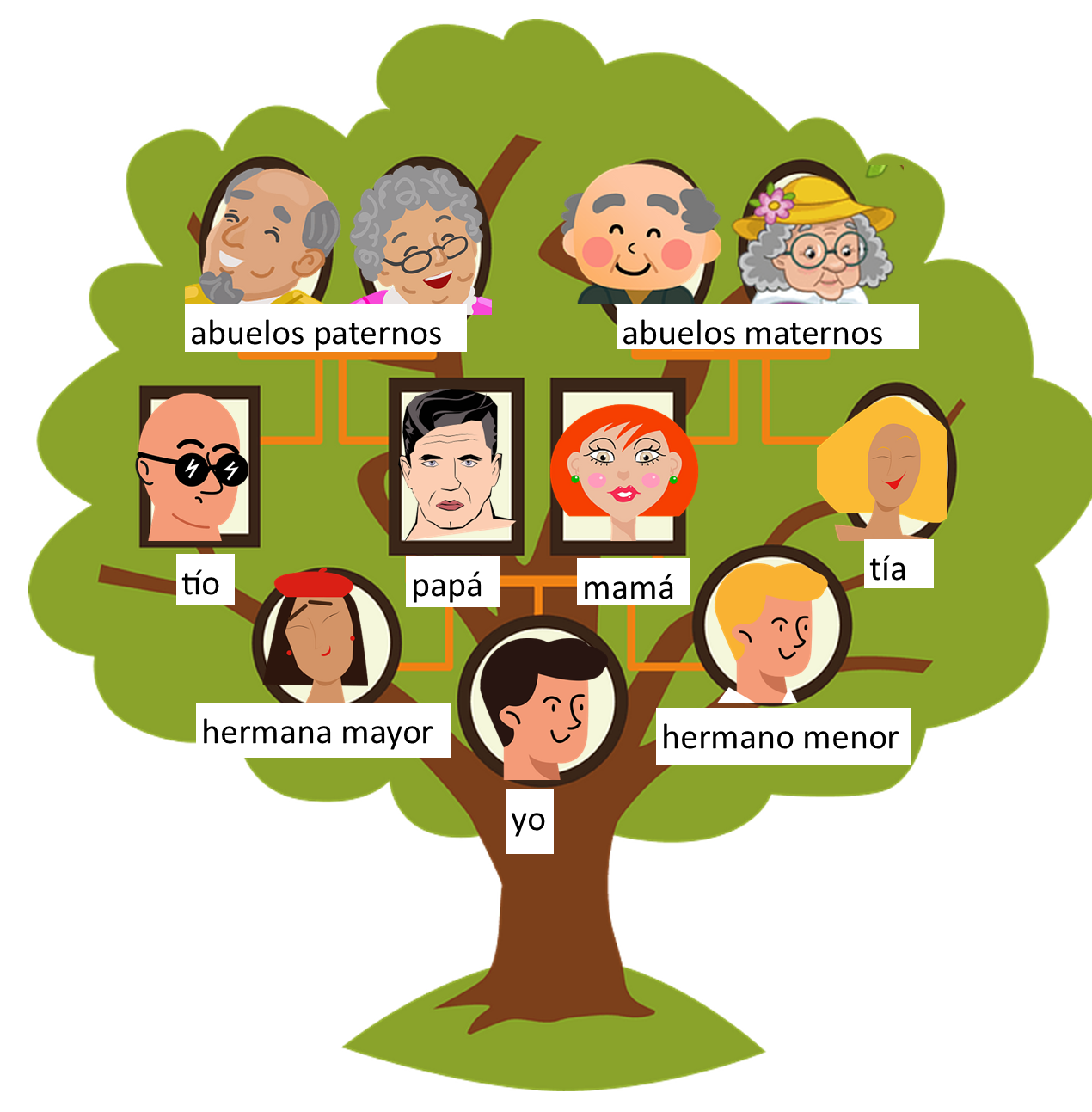Semana 7 (Los posesivos, la familia y preferencias)
Expresar posesión: “tener”, “ser de”, adjetivos posesivos
Para expresar posesión en español, igual que en inglés, hay varias opciones.
¿Recuerdas el verbo “tener”?
| Spanish | English | |
|---|---|---|
| Yo | tengo | I have |
| Tú | tienes | you have |
| Él/ Ella/ Usted | tiene | he/she/ you formal has |
| Nosotros/ Nosotras | tenemos | We have |
| Vosotros/ Vosotras | tenéis | you guys have |
| Ellos/ Ellas/ Ustedes | tienen | they/ you formal have |
- Tengo un perro.
- Mi vecino tiene tres gatos.
This is the simpler way to talk about ownership. Like in English, you would use the owner followed by the verb “to have” and the thing that is owned.
¿Cómo conjugamos “ser de”?
| Yo | soy de | Nosotros/ nosotras | somos de |
| Tú | eres de | Vosotros/ vosotras | sois de |
| Él/ ella/ usted | es de | Ellos/ ellas/ ustedes | son de |
- Soy de España.
- Es el teléfono de la profesora → it is the professor’s phone (it is the phone of the professor).
- ¿De quién es esta camiseta? → Whose t-shirt is this?
- Es de María → It’s Maria’s.
Adjetivos Posesivos
Finally, we can also use possessive adjectives to express ownership or possession. These match the person who owns it, but agrees in gender and number with the OBJECT.

Como vemos arriba, los adjetivos posesivos siempre se colocan antes de sustantivos o palabras que acompañan, al igual que en inglés.
¡Recuerda! Son adjetivos, y como tal deben concordar en género y número con el sustantivo (the owned thing, not the owners!)
When you say “mis amigos” it’s not that there’s more than one you, it’s the friends, the noun, that’s plural.
Vamos a practicar:
La familia

La familia
| Árbol genealógico | family tree |
| bisabuelo/a | great-grandfather/great-grandmother |
| abuelo/a | grandfather/grandmother |
| nieto/a | grandson/granddaughter |
| padres | parents |
| padre/papá/papi | father/dad/daddy |
| madre/mamá/mami | mother/mom/mommy |
| esposa/mujer | wife |
| esposo/marido | husband |
| hijos | children |
| hijo/a | son/daughter |
| hermanos | siblings |
| hermano/a | brother/sister |
| parientes | relatives |
| tío/a | uncle/aunt |
| sobrino/a | nephew/niece |
| primo/prima | cousin |
| suegro/a | father-in-law/mother-in-law |
| nuera | daughter-in-law |
| yerno | son-in-law |
| cuñado/a | brother-in-law/sister-in-law |
| madrina | godmother |
| padrino | godfather |
| ahijado/a | godson/goddaughter |
| madrastra | stepmother |
| padrastro | stepfather |
| hijastro/a | stepson/stepdaughter |
| medio/a hermano/a | half-brother/half-sister |
| hermanastro/a | stepbrother/sister |
Más vocabulario:
- Gemelos/as: twins (identical)
- Mellizos/as: twins (fraternal)
- Novio/a: boyfriend/girlfriend (also groom/bride)
- Adoptado/a: adopted
- Huérfano/a: orphan
- Hijo único – hija única: only child
- Mayor: older (el/la mayor–oldest)
- Menor: younger (el/la menor–youngest)
- Prometido: fiancé
- Prometida: fiancée
- Estar Soltero/a: to be single
- Estar Casado/a: to be married
- Ser Viudo: to be widower
- Ser Viuda: to be widow
- Estar Separado/a: to be separated
- Estar Divorciado/a: to be divorced
- Ex marido: ex-husband
- Ex mujer: ex-wife


